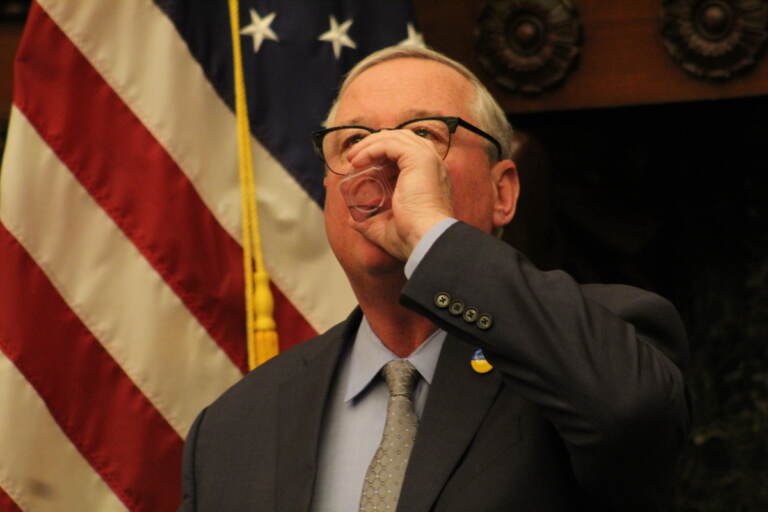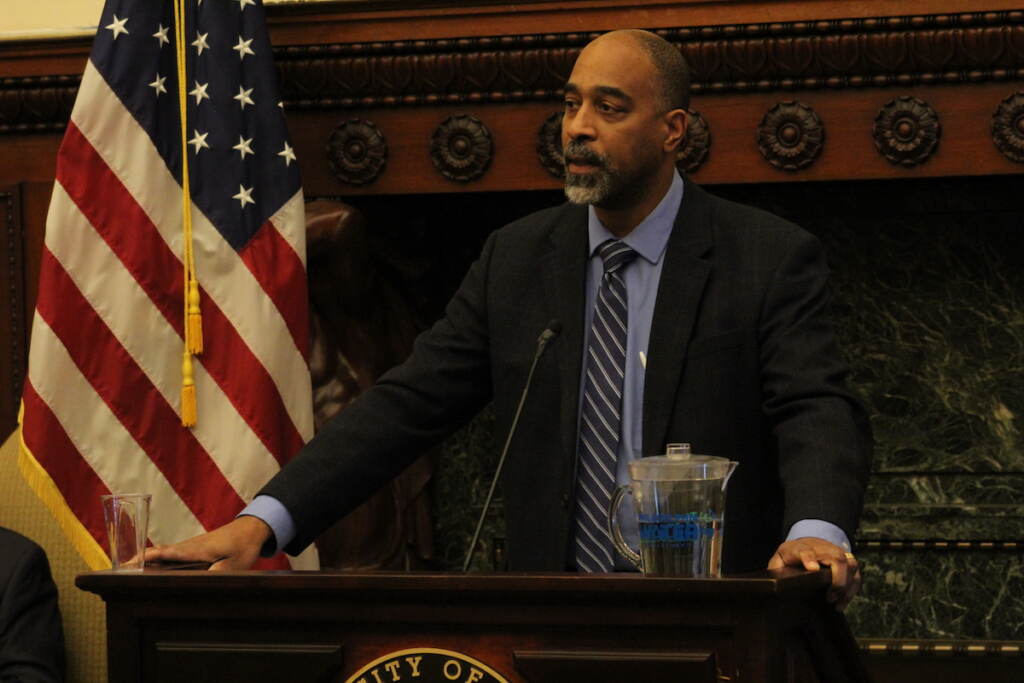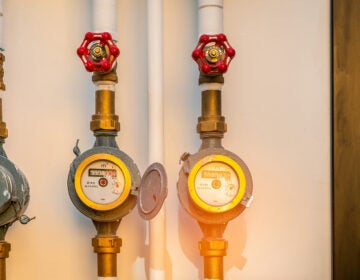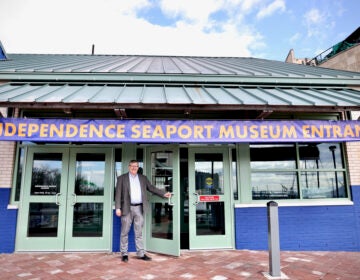Philly tap water still safe to drink and ‘will not be impacted’ by chemical spill, city says
Philadelphia officials gave the all-clear Tuesday, after analyzing over 100 samples of water they feared could be affected by a chemical spill.
Listen 0:54
Mayor Jim Kenney took a sip of water after announcing Philadelphia's tap water will not be impacted by last Friday's chemical spill in Bucks County. (Cory Sharber/WHYY)
City officials say Philadelphia residents’ drinking water is safe and will not be impacted by the chemical spill that occurred Friday on a tributary of the Delaware River.
“It’s safe, it’s contaminant free, and we can all enjoy it to drink, to cook with, wash with — whatever you want,” said Mike Carroll, deputy managing director of the City’s Office of Transportation, Infrastructure, and Sustainability during a livestreamed briefing Tuesday.

The announcement came after days of periodic updates about the safety of the city’s drinking water, as the Water Department tested water at the Baxter Water Treatment facility in Northeast Philadelphia, which lies about eight miles downriver from the spill.
Late Friday evening, more than an estimated 8,000 gallons of a water-based latex finishing solution from the Trinseo Altuglas chemical facility in Bristol, Bucks County spilled into the Delaware River.
The owner of the plant, which makes acrylic resins, said the spill was the result of equipment failure. On Sunday, officials advised residents to buy bottled water — causing supply shortages at some supermarkets across the region. However, the city later informed the public that the water was safe, and none of the contaminants had yet been detected at the Baxter Water Treatment facility. Instead, the city alert system advised residents to store tap water in containers, in the event the chemical spill did pollute drinking water.
Philadelphia Health Commissioner Cheryl Bettigole said even the slightest possibility that chemicals could pollute drinking water supplies meant it was important to be transparent.
“Knowing it’s very low risk, but knowing that we can’t say it’s zero risk — that felt important to share,” she said.
The chemicals in the hazardous fluid include butyl acrylate, ethyl acrylate, and methyl methacrylate. As of Monday, 60,000 gallons of contaminated water had been collected.
The Water Department said it tested water in the Delaware River and the raw water supply held in a basin at the Baxter plant “around the clock,” as the water impacted by the spill flowed through the river. Officials predicted Monday that the impacted water would clear the area by Thursday.
“The key for us is not letting anything in the system to begin with and hopefully the tide will bring it down and dissipate into the ocean,” Mayor Jim Kenney said Monday.
Tuesday’s announcement that the spill will not impact the city’s water supply is based on hydraulic modeling accounting for the river flow, the twice-daily tides, and rainfall that entered the Delaware River watershed Monday and Tuesday. This modeling indicates that the spill “has dispersed” in the river, Carroll said.
The Water Department estimates that water brought into the Baxter treatment plant early Tuesday morning — which tested free of contamination — will take about 48 hours to move through treatment and out of the plant, Carroll said.
“When we open the gates again, we know that that water is going to be in that window where there’s no contamination in the river,” he said.
The city evaluated effective treatment methods while waiting to see if the water would become contaminated. The city said it had a plan if contamination occurred, but did not release it publicly.
“I am grateful that no residents were exposed to unsafe chemicals in the city’s tap water following the spill,” Mayor Jim Kenney said in a statement Tuesday. “This is a result of the swift action, caution, and preparedness of city departments and partners as well as their commitment to ensuring the well-being and health of all Philadelphians.”
Officials say they will stop issuing advisories about the situation, but will continue to test the water, working with the Pennsylvania Department of Environmental Protection to determine when it’s safe to stop.
The city also plans to conduct after-action reviews of its communications with the public and other elements of the response.

Subscribe to PlanPhilly
WHYY is your source for fact-based, in-depth journalism and information. As a nonprofit organization, we rely on financial support from readers like you. Please give today.








